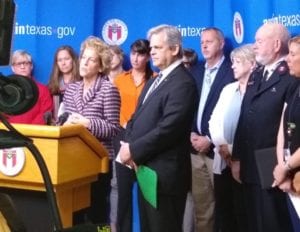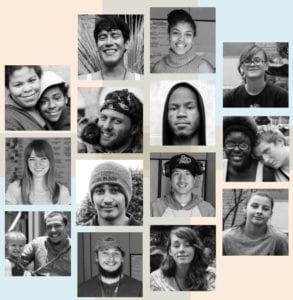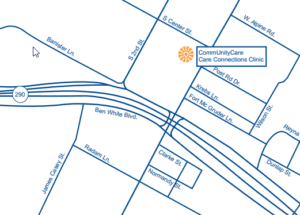Community Successes

Ending homelessness requires a systemic approach across the community. Changing economic realities, the unpredictability of life, and unsafe or unwelcoming family environments sometimes create situations where individuals, families, or youth are at risk of or end up experiencing homelessness. Some people are constantly on the verge of homelessness, so we may never be able to prevent all homelessness or completely eliminate it. The key, however, is having a strong service system in place and a community-based response for identifying these individuals and quickly meeting their needs.
Thus, functionally ending homelessness does not mean that no one will ever experience a housing crisis again. It means that we have a sustainable, systemic response in place that ensures homelessness is prevented whenever possible, or is otherwise a rare, brief, and non-recurring experience.
Our community is receiving national recognition for successfully implementing strategies that end homelessness. We highlight the programs below as examples of successful collaborations that have had a measurable impact on ending homelessness locally.
-
Housing Homeless Veterans
 Austin signed on to the national initiative called The Mayor’s Challenge to End Veteran Homelessness as a way to solidify partnerships and secure commitments to end Veteran homelessness. The call to action was first announced by First Lady Michelle Obama and echoed by the Secretaries of HUD and the Department of Veterans Affairs, USICH, and the National League of Cities. Austin accepted the challenge under then Mayor Lee Leffingwell in 2013, continued the work with Mayor Steve Adler and reached the national benchmarks set for ending Veteran homelessness in late summer 2016.
Austin signed on to the national initiative called The Mayor’s Challenge to End Veteran Homelessness as a way to solidify partnerships and secure commitments to end Veteran homelessness. The call to action was first announced by First Lady Michelle Obama and echoed by the Secretaries of HUD and the Department of Veterans Affairs, USICH, and the National League of Cities. Austin accepted the challenge under then Mayor Lee Leffingwell in 2013, continued the work with Mayor Steve Adler and reached the national benchmarks set for ending Veteran homelessness in late summer 2016.
-
Youth Homelessness Demonstration Program
 Austin is a community fiercely committed to ending homelessness, so when our data showed that over 600 unaccompanied youth were experiencing homelessness, we were eager to tackle the issue. In January 2017, Austin was awarded a transformative $5.2 million demonstration grant by HUD Youth Homelessness Demonstration Program (YHDP).
Austin is a community fiercely committed to ending homelessness, so when our data showed that over 600 unaccompanied youth were experiencing homelessness, we were eager to tackle the issue. In January 2017, Austin was awarded a transformative $5.2 million demonstration grant by HUD Youth Homelessness Demonstration Program (YHDP).We’ve worked to ensure there is clear pathway for young people to swiftly access critical services and to increase resources that are dedicated to the specific needs of young people who experience homelessness. This powerful partnership moved 76 youth to permanent housing during the first six months of the program starting in October 2018. We also saw a 56% reduction in unsheltered homelessness among young adults through our 2019 Point in Time Count.
Read more about YHDP here
YHDP Coordinated Community Plan
Joint TH RHH Workflow
-
Pay for Success
In April 2018 ECHO and Caritas of Austin implemented a Pay for Success pilot project serving 24 households in Austin. The Pay for Success model builds public/private partnerships to address homelessness by recruiting private investors to provide up-front capital to scale up housing and support services. Later, if the project achieves the desired outcome of getting and keeping people housed, the private investors are repaid, potentially realizing a return on their investment. In this way private investors take on the risk of program failure while public entities maintain stewardship of public funds by only paying for successes.
Full project implementation is planned for Fall 2019 and is expected to provide Permanent Supportive Housing to 250 of our neighbors experiencing chronic homelessness. ECHO is thrilled to have both local government and private funders’ support for this project. We are encouraged by the results of the pilot project so far and anticipate a successful effort that will help end homelessness for hundreds of our neighbors in Austin.
Read more about Pay for Success here
ECHO Pay for Success Feasibility Report
-
Care Connections Clinic
 Opened in March 2019, the Care Connections Clinic is a collaborative project that brings together medical, behavioral, and social service providers to help meet the needs of vulnerable and under-served patients. “CareCo” is a CommUnityCare network clinic where patients can access a variety of supports including shelter/housing navigation, benefit enrollment, and psychiatric services. The unique partnerships at CareCo have yielded significant cost savings at a health systems level and improved patient outcomes and access to services. Working out of CareCo, ECHO assists with housing outreach and navigation to connect individuals to housing supports as well as providing SOAR services to help individuals apply for Social Security benefits.
Opened in March 2019, the Care Connections Clinic is a collaborative project that brings together medical, behavioral, and social service providers to help meet the needs of vulnerable and under-served patients. “CareCo” is a CommUnityCare network clinic where patients can access a variety of supports including shelter/housing navigation, benefit enrollment, and psychiatric services. The unique partnerships at CareCo have yielded significant cost savings at a health systems level and improved patient outcomes and access to services. Working out of CareCo, ECHO assists with housing outreach and navigation to connect individuals to housing supports as well as providing SOAR services to help individuals apply for Social Security benefits.

